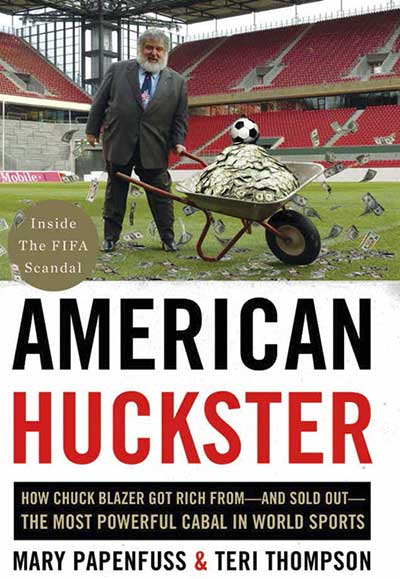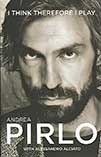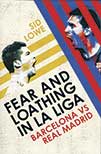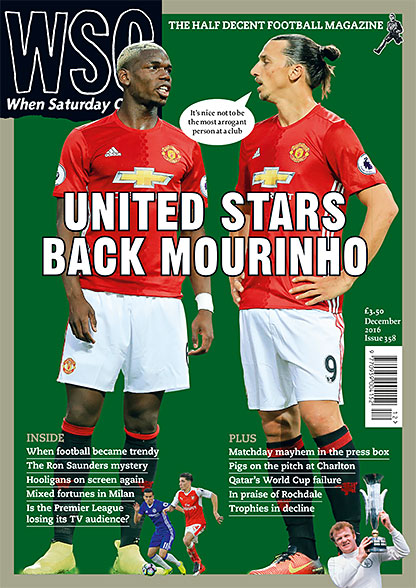Search: 'Qatar'
Stories
 How Chuck Blazer got rich from – and sold out – the most powerful cabal in world sports
How Chuck Blazer got rich from – and sold out – the most powerful cabal in world sports
by Mary Papenfuss & Teri Thompson
HarperCollins, £20
Reviewed by Alan Tomlinson
From WSC 353 July 2016
Chuck Blazer: the Father Christmas lookalike whose weight had mushroomed to 450lbs by the time the FBI and the US Internal Revenue Service (IRS) nobbled him on the Manhattan pavement outside his Trump Tower base in November 2011. This was just under a year after FIFA’s decision to award the next two World Cups to Russia and Qatar, and while a generation of FIFA powerbrokers and crooks was beginning to shatter the silence of a long-held code of omertà.
 by Andrea Pirlo with Alessandro Alciato
by Andrea Pirlo with Alessandro Alciato
BackPage Press, £9.99
Reviewed by Joyce Woolridge
From WSC 329 July 2014
Reading this autobiography of a playmaker nicknamed “Mozart” is like going to the opera: some bloke comes on and sings very loudly in Italian at you for a couple of hours, it’s all very dramatic and enjoyable, but you don’t always know quite what’s going on. In no discernible order, its voluble and intelligent subject, who “has an opinion about everything and I’m not ashamed to express it”, launches into an erratic, extended and idiosyncratic monologue. There are even (mostly much needed) footnotes to explain some of the passing references, although glossing ultras as “the self-styled, most passionate, vocal and committed supporters” was probably unnecessary.
Many of Andrea Pirlo’s lines do sound as if they could have come from, say, Don Giovanni. When his ten years with AC Milan end with the gift of a pen (how many domestic footballers are presented with something to write with when shown the door?) he declares: “Still, I raised a smile because I know how to laugh, long and loud.” (Cue ear-splitting Rabelaisian guffaws.) Various club presidents and managers memorably strut the stage. Marcello Lippi theatrically denounces the Italian dressing room: “Bunch of bastards, bunch of spies”; Antonio Conte hurls water bottles at Juve bellowing: “It’s time we stopped being crap.”
The reader is never in doubt that the text was originally in Italian, making it refreshingly different from the prosaic platitudes of the standard British footballer’s life. True, the highly charged style occasionally strays into Swiss Toni territory: “When you’re in love, it’s time you need. When the feeling’s gone, having an excuse can help.” Again, no British footballer could ever get away with statements such as Pirlo’s lament after Alex Ferguson “unleashes” the ferocious Park Ji-Sung to shadow the Italian midfielder in a Champions League tie: “He’s essentially a man without blemish, but he ruined that purity just for a moment… a fleeting shabbiness came over the legend that night.”
However, usually the purple prose fits the subject matter perfectly. Pirlo’s visceral reaction to losing the 2005 Champions League final in Istanbul will delight not only Liverpool supporters. Not for him the mealy mouthed “gutted”. After this “mass suicide where we all jumped off the Bosphorus Bridge… I no longer felt like a player… But even worse, I no longer felt like a man.” Walking up to take the first penalty in the 2006 World Cup final shootout is “barely 50 metres. But it’s a truly terrible journey, right through the heart of your fear.”
Certain footballers’ preoccupations transcend nationalities. Pirlo’s favourite pursuits, we learn, at some length, are mickey-taking, PlayStation (“after the wheel, the best invention of all time”) and wine, albeit from his father’s vineyards. With a grand flourish he turns down €40 million (£32m) to join Qatar’s Al-Sadd, preferring instead one last bow for his country in the 2014 World Cup. As he says earlier: “Take someone like Antonio Cassano. He says he’s slept with 700 women in his time, but he doesn’t get picked for Italy any more. Deep down, can he really be happy?”
 Barcelona vs Real Madrid
Barcelona vs Real Madrid
by Sid Lowe
Yellow Jersey, £18.99
Reviewed by Dermot Corrigan
From WSC 322 December 2013
“Barcelona good, Madrid bad” is a pretty common idea among English-speaking football fans. Even those who question the Catalan club’s “football philosophy”, or its board’s financial dealings with Qatar and Brazil, still often see Barça as purer than, and morally superior to, their rivals from the Spanish capital.
This idea can be traced all the way back to George Orwell’s Homage To Catalonia – and is just plain wrong, according to Sid Lowe’s new contribution to the growing pile of English language books on Spanish football.
Fear And Loathing In La Liga: Barcelona vs Real Madrid takes a broader approach than most, looking closely at the impact of political and cultural trends on the game, including epigraphs from writer Antonio Machado and Swansea City attacker Michu. The early 20th century poet’s quote is of “the two Spains”, a famous line referring to the pre-Civil War right-left political divide. But Lowe appears to agree more with the modern player’s preference to avoid choosing one or the other.
The strongest chapters consider the effect of the 1936-39 conflict on football and turn over some pretty widely held preconceptions. Madrid (the city) was not Franco’s base, instead it suffered the fiercest nationalist attacks. This meant Real Madrid had to stop playing official games, their ground was ruined, and their republican club president Rafael Sánchez Guerra was imprisoned when the city finally fell to Franco’s forces. Barcelona was less directly impacted by the fighting, so FC Barcelona kept playing in the Catalan Championship and Mediterranean League, then toured North America.
During the first 15 years of the dictatorship the Catalan club were also more successful, winning five La Liga titles to Real Madrid’s none. In those years the Barça boardroom was stuffed with well-connected businessmen, just as it is now. Professional football clubs – in Spain under Franco, just as in England under Tony Blair – tend to go with the political flow. Which explains Barcelona’s current embrace of Catalan nationalism.
Lowe’s impressive list of interviewees includes Alfredo di Stéfano, Johan Cruyff, Luís Figo, Zinedine Zidane and Andrés Iniesta. He uncovers new archival evidence about how Barça president Josep Sunyol died in 1936, and why Di Stéfano joined Madrid not Barça in 1953. There are also neat mentions of Barça’s (unwitting) role in the murder of Leon Trotsky, as well as Madrid’s links to the Beatles in the 1960s and Pedro Almodovar in the 1980s. It’s a rare book that discusses ETA (the Basque separatist organisation) and Michael Owen on the same page.
The weakest section is towards the end, as by now there is little new to say on José Mourinho the ex-translator versus Josep Guardiola the former ballboy. But that’s a minor quibble. We have already seen how closely Spain’s two biggest clubs have mirrored each other through the years. Real Madrid and Barcelona do not represent different strands in Spanish history, or competing political points of view, they’re just two sides of the same coin.
 The lack of a winter break is more of an excuse than an explanation for the failure of English teams, says Adam Bate
The lack of a winter break is more of an excuse than an explanation for the failure of English teams, says Adam Bate
As we approach the climax of another English football season, it is perhaps only to be expected that there should be the usual talk of tiring bodies. Equally unsurprising is the now familiar demand for the introduction of that much-vaunted miracle cure: the winter break. A two-week gap in the fixture list has long been viewed as the answer to English football’s problems. Fabio Capello claimed “all the players were really tired” after England’s miserable performance at the World Cup in 2010. His thoughts were echoed by one of his predecessors, Sven-Göran Eriksson, who added: “It’s more difficult for England than other countries to do well in a big tournament. You need a break.”
